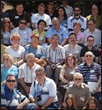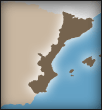Notable People
Of course, it would be difficult for any family which has existed for over four hundred years to be without notable people. However, we believe we have at least our share. Somehow, a great many of our ancestors have been politically active, artistic, entrepreneurial, or a combination of the above. Since we are claiming that there are notable people among our ancestors, we must go on to make note of some of them.
José María Buchaca y Freire (Valencia 1813-Cienfuegos 1848) was inclined towards writing and had definite progressive ideas, which were contrary to the social system of the time, as is seen in his work Poesías Eróticas (Erotic Poems), published in 1836, when he was aged but 23, which was before he settled in Cuba. This work broke with the ethic of the time, which was ultra-conservative, and created a new literary style. José María's liberal position endangered him more than the scant eroticism of his poems. According to reliable sources, his book was so successful that he was recognized as the first poet to reside in Cienfuegos.
He founded the “Real Colegio de Primera y Segunda Enseñanza en Literatura y Bellas Artes” (The Royal Primary and Middle School for Literature and the Arts). It was the first middle school to exist in Cienfuegos. On April 20th 1846, he was promoted to the position of Secretary and Director of the Town’s Patriotic Council and he received the title of Benefactor of the City of Cienfuegos.
Emilio P. Buchaca Molina (Cienfuegos 1848-Cienfuegos 1904) was a good friend and personal doctor to José Martí, “father of Cuba's independence”, during Martí’s exile in New York.
Josep Bochaca i Serra (Tremp 1867-Barcelona), a Priest, started writing the family tree of the Boxaca, Botxaca, Bochaca, Buchaca, or Butxaca.
Francesc de Paula Bochaca i Serra (Tremp 1870-Barcelona 1960) founded, in 1895, “El Arte Católico”, Casa Bochaca, wholly dedicated to religious articles. He even became town mayor of la Seu, and, as he said with some pride, it was confirmed by royal decree by Don Antonio Maura. During the postwar years and until the 1960s, there was a period of great expansion, exporting to America and Europe.
His restlessness, ability to relate, and his vision as a businessman led him to make contact with the transport company la Hispano Urgelense. He even traveled to Paris to finalize details with the company and to give the necessary impulse to consolidate it. Nowadays it continues to exist under the name of the Alsina Graells, Ltd.
Emilio José Buchaca Bright (Brooklyn 1886-Albany 1984) taught English to immigrants while attending college, graduated as an electrical engineer in 1906 and worked for the Telephone Company until 1951. Forced into retirement on account of his age, he found other work until the age of 91. Meanwhile, in the mid-1920s, the Telephone Company seconded him to ITT to oversee the installation of the first telephone service in Spain.
Francesc Buchaca Xxxx (Barcelona, XIX-century): Independent of the Buchacas of Cienfuegos of whom we have spoken at length, we have information on another Buchaca who went to Cuba much later than the liberal Buchaca from Valencia. He is therefore totally unconnected to the descendants of José Ma Buchaca y Freire.
The Buchaca from Santiago de Cuba was founder of the shop of the name “La Bohemia”, warehouse and food and liquor shop. During the decade 1920-1930 it was famous for being the shop in that business with the best selection and highest turnover in the town.
Josep Bochaca Costa (Tremp 1890-Beziers 1978) formed his own company and built the aviation hangars in Bron, near Lyon (France), as well as other industrial buildings in Lyon itself.
Josep Andreu Bochaca Nadeau (Bordeus 1898-Madrid 1975) was born in Bordeus. He was vice-president of the “Compañía Metropolitano de Madrid” (the “Metro”) until his death.
Miquel Bochaca Birbe (Tremp 1900-Tremp 1986) became a mail service employee in the position of postman. He also continued the kiosk set up by his father. The former kiosk became the “Llibreria Bochaca”, a unique reference for a town which had doubled its inhabitants owing to the hydroelectric power stations. We should add here that on the way to becoming what it is today, the "Llibreria Bochaca", one of the most prestigious and oldest bookshops, which has been awarded several prizes, had many setbacks.
Josep Bochaca Vidal (Gerri de la Sal 1904-Serra de Pàndols 1938), when he was in Gerri, liked hunting, horseback riding, and going to the Morisca dance during the annual town festival. The Morisca had not been danced for eight or nine years--possibly due to a lack of dancers—when Josep retrieved the steps of the dance and danced it again with Ángels del Tendé in 1923. He is thus credited with saving this folk dance from extinction.
Juan Roberto Bochaca Torelli (Mendoza 1934-Mendoza 2006): architect, professor of the Faculty of Architecture, Urbanism, and Design in the University of Mendoza (Argentina).

Reunions
People from all over the globe gather to celebrate their one common connection - a family name.

Origin
Our earliest finding of Boxaca is in Freixe, three brothers, and we assume their father was born about 1545.